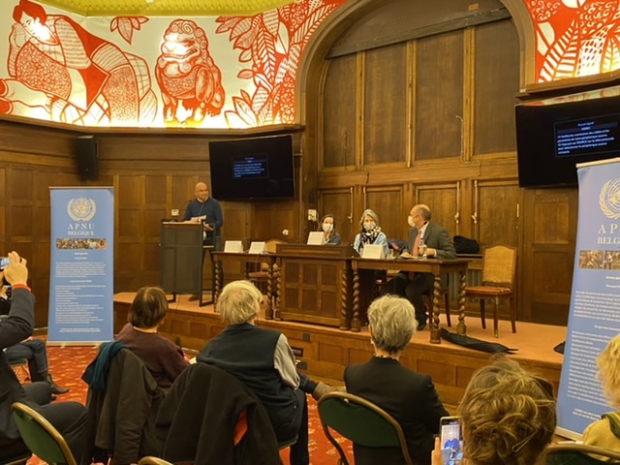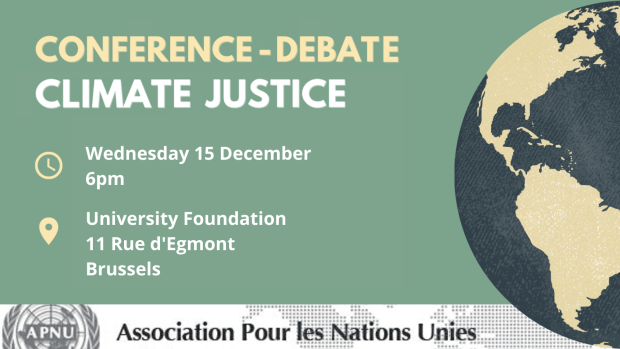Event: Conference on Climate Justice - 15th December 2021
Discussion details

Climate Justice
Impressions from the APNU conference
The climate crisis is primarily affecting the poorest 50% of world’s population who are responsible for only 10% of emissions, and it is the richest 10% of the world's population that is responsible for half of all CO2 emissions, said François Gemenne, Professor, Environmental Geopolitics, Université Libre de Bruxelles, in his speech at the conference on Climate Justice on 15 December. If we want to obtain equality in emissions, then each Belgian would have to divide current emissions by 5, he said.
Professor Gemenne introduced the theme of climate justice in a conference in Brussels organized by the French speaking UN Association in Belgium (APNU). Three experts, François Gemenne, Céline Nieuwenhuys, Secretary General, Federation of Social Services, and Delphine Misonne, Professor, Law, Governance and Sustainable Development, Université Saint-Louis, gave their readings of the topic. The event was moderated by Thierry Lucas, Senior Policy Coordinator at UNEP Brussels Office.
The experts addressed various aspects of the issue, starting with the concept of double injustice as described by Professor Gemenne. Analogies were made with the impact of the Covid-19 pandemic on society across the world, including in Belgium, where the poorest populations bear the brunt of Covid-19. This social injustice within societies is complemented by the injustice at global level - between countries- with industrialized countries on the one hand, whose impact on climate is far greater, and the ‘countries of the South’ on the other hand. In both these contexts, measures are needed to redress the balance. Professor Gemenne also pointed at the absence of a common understanding of what equity means amongst countries, which is needed however for the UN to redress the balance.
Ms Nieuwenhuys zoomed in on the reality of Covid-19 pandemic and its effects on society. Ms Nieuwenhuys pleaded for better preparation of the fragile populations, for example by ensuring they have access to technologies which richer populations have, and more generally, integrating the realities of the poor into the policies to address the pandemic [and by analogy the climate crisis]. In addition, she questioned whether we might need to consider that certain personal freedoms, referring to excessive luxury consumption by wealthier populations as an example, to be restricted in times of crisis in order to protect the fragile populations.
Professor Delphine Misonne, focused on international climate governance, as an area where these inequalities are being expressed. She referred to the Stockholm conference in 1972, which formulated the link between development and environment, and the need to support ‘the South’ through development, thereby very much reflecting the inter-state relations at the time. She observed that in COP negotiations, since 30 years, negotiators speak about climate but have the tendency to personalize the problem, and that the negotiation talks much rather reflect the social struggle amongst states. What is missing in these talks, is the notion of law. She had good hopes in the development of national processes however, such as the Urgenda Climate Case, and international environmental law enforced by Courts, and implementation of conventions (such as Aarhus Convention) to address the injustices. Climate justice helps us to not see the failures to address climate change as a diplomatic issue only. Citing the Urgenda Climate Case as a historic moment for climate justice, she explained that by using civil law, citizens have established that their government has a legal duty to prevent dangerous climate change and protect its population from the effects of climate change. The case transformed domestic climate change policy in the Netherlands and has inspired climate change cases in many more countries around the world. This type of development, which speaks to the public opinion and brings to the forefront the human aspects of the issue, is helping us move forward to address climate injustice both nationally and internationally. In her view, making the human central is however not enough present in international negotiations. She also put high hopes in the role and contributions of youth, how they are increasingly included at the table, and addressing intergenerational equity.
Discussions with the audience touched upon the weaknesses and strengths of the Kyoto Protocol, inequalities resulting from trade treaties, mitigation and adaptation policies, the issue of migration, the role of women and more generally, the concept that change will come bottom up as we re-localise the action.
------------------------
Programme and invite

Background information - Invitation
Global warming will have dramatic effects for the whole planet, but its impacts will be unequally distributed. Climate events will mainly affect a range of developing countries. People in farming communities in low-income countries, who are largely dependent on the climate, will be the first to be affected. They are at risk of increased poverty and food insecurity, population displacement and forced migration, as well as a greater likelihood of conflict.
Yet the poorest countries' share of cumulative greenhouse gas emissions is only a fraction of that of industrialised countries. While the richest 10% of the world's population is responsible for half of all CO2 emissions, the climate crisis is primarily affecting the poorest 50% who are responsible for only 10% of emissions. It is estimated that the carbon footprint of the richest 1% of the world's population is on average 175 times that of the poorest 10%.
Even in developed countries, measures to tackle climate change can initially be relatively costly or discriminatory for the poor and low-income earners. There have been several recent successful court cases to force governments to implement their international climate obligations.
How can these various challenges be integrated into climate policies and actions?
The topic will be discussed by:
- François Gemenne, Professor, Environmental Geopolitics, ULB
- Céline Nieuwenhuys, Secretary General, Federation of Social Services
- Delphine Misonne, Professor, Law, Governance and Sustainable Development, Université Saint-Louis
The conference will be moderated by Thierry Lucas, Senior Policy Coordinator, United Nations Environment Programme (UNEP) Brussels Office.
Log in with your EU Login account to post or comment on the platform.